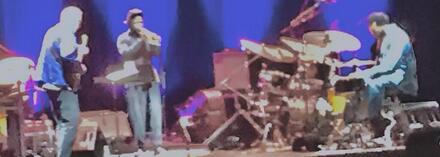Sensitives to the max, Bill Frisell and Ambrose Akinmusire felt the audience's somber mood in the wake of war in Israel and responded with appropriate requiem and balm. The guitarist and trumpeter filled out their usual Owl Song trio by replacing drummer Herlin Riley with Timothy Angulo, whose previous experience with Akinmusire made the substitution seamless, as he laid down slapping brush rhythms and proceeded to offer every kind of subtle, ever-changing and imaginative support. Frisell's fragile guitar lines and Akinmusire's deephearted horn melodies chased each other in slow motion as Frisell demonstrated his special intuition for knowing just when he's about to hit a harmonic clash, then softly drawing back. Or Akinmusire would offer a line, and Frisell would find a chord to fit it -- at one point Akinmusire hit a high note outside the scale he'd been working, and Frisell strummed a basic chord as if to say, "Hey, if your note's high enough, it'll harmonize with anything." Frisell occasionally let his effects run wild, but supplied structure with electronic loops, such as one funky riff that the trio explored for a good 10 minutes. Although Akinmusire trod an unlimited geography of musical paths, he largely confined himself within an emotional latitude of pensive beauty.
In the second set, Frisell's symmetrical quintet with a standup bass and a drummer on each side of him sparked thoughts of both Ornette Coleman and the Grateful Dead. One of the drummers, baseball-capped Kenny Wollesen, lent the ensemble dimension by doubling on vibraphone, and his loose-limbed approach made for stirring interaction with the snappier style of his opposite number, Thomas Morgan. Bassists Tony Scherr and Rudy Royston sometimes played off each other, sometimes harmonized with Frisell, often sounded like four hands on one instrument. The music was constructed in cues, one moving into another without a break and with unconscious fluidity, not to mention a commonality of harmony that made the first half hour sound like an improvised symphony. It began with a light, semi-Caribbean "Cast Your Fate to the Wind" feel, and gradually gathered momentum and textural density, especially thanks to Wollesen's vibes. Though some composition was evident, and Frisell returned to his loops a few times, these dudes were taking plenty of chances and occasionally hit harmonic walls, a welcome reminder of what jazz really is. A meandering dead space reminiscent of the Grateful Dead's "Dark Star" detracted little from a satisfying quintet experience with substantial variety. Frisell closed with a crisply arranged "What the World Needs Now Is Love" by Burt Bacharach (died this year) and encored with "People," made famous by Barbra Streisand. Yes, Frisell, gray-haired and hunched over his Telecaster, is old enough (72) to remember when those songs were hits (1965 and 1964), and old enough to remember when Israel expanded its borders after being attacked in the Six-Day War (1967). A little sentiment harms no one.
PHOTO BY FUZZY BAROQUE.

